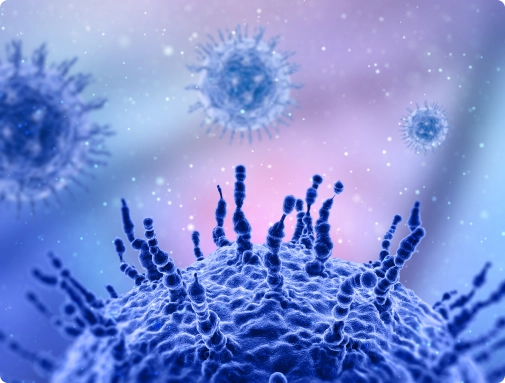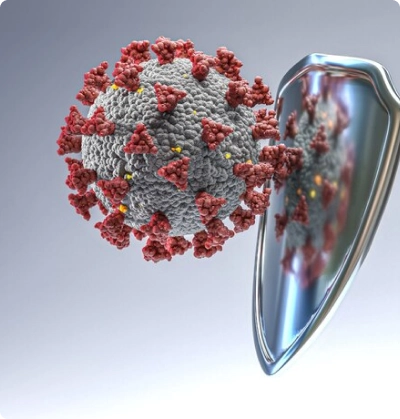Bacterial Infections Treatment Service
Diagnosis, Treatment & Telehealth Support for Bacterial Infections
Bacterial infections occur when harmful bacteria invade the body, multiply, and disrupt normal functions, leading to a wide spectrum of illnesses. While many bacteria are harmless or beneficial, pathogenic bacteria can cause diseases ranging from minor skin irritations to life-threatening systemic infections. Early detection and appropriate treatment are critical for preventing complications and promoting recovery.

Common Bacterial Infections We Address
Urinary Tract Infections (UTIs)
UTIs are among the most common bacterial infections, particularly in women. Symptoms include frequent urination, burning or pain during urination, cloudy or bloody urine, and lower abdominal discomfort. If untreated, UTIs can progress to kidney infections, causing fever and flank pain.
Strep Throat
Caused by Streptococcus bacteria, strep throat manifests as a sudden sore throat, difficulty swallowing, fever, swollen lymph nodes, and sometimes white patches on the tonsils. It is highly contagious and requires antibiotic treatment to avoid complications like rheumatic fever.
Sinus Infections (Bacterial Sinusitis)
Bacterial sinusitis is characterized by persistent facial pain or pressure, nasal congestion, thick nasal discharge (yellow or green), headache, and fever. Chronic cases may require longer antibiotic courses or specialist intervention.
Skin Infections (e.g., Cellulitis, Impetigo)
Bacterial skin infections can cause redness, swelling, warmth, and tenderness at the affected site. Cellulitis involves deeper skin layers and may spread rapidly, requiring prompt antibiotic therapy. Impetigo presents as crusty sores, often in children, and is highly contagious.
Gastrointestinal Bacterial Infections
Caused by bacteria like Salmonella, E. coli, or Clostridium difficile, these infections result in diarrhea (sometimes bloody), abdominal cramping, nausea, vomiting, and fever. Proper hydration and medical care are essential, especially in severe cases.
Respiratory Bacterial Infections
Including pneumonia and bronchitis, these infections cause cough, chest pain, fever, and difficulty breathing. Pneumonia, especially in older adults or those with weakened immune systems, can be severe and requires prompt antibiotic treatment.
Sexually Transmitted Bacterial Infections
Infections such as chlamydia, gonorrhea, and syphilis can cause varied symptoms including discharge, painful urination, sores, or no symptoms at all. Early diagnosis and treatment are essential to prevent serious reproductive and systemic complications.
Recognizing Symptoms of Bacterial Infections
Early identification of bacterial infections helps prompt treatment. Common symptoms include:
- Persistent fever and chills
- Fatigue and malaise
- Localized redness, swelling, warmth, or pain
- Swollen lymph nodes near the infection site
- Unusual discharge or drainage from wounds or body openings
- Gastrointestinal disturbances such as nausea, vomiting, or diarrhea
- Respiratory difficulties, including cough and shortness of breath
If symptoms worsen or new symptoms appear, seek medical evaluation immediately.

Telehealth Services for Bacterial Infections
Our telehealth platform offers:
- Same-day or next-day virtual appointments
- Electronic prescriptions sent directly to your preferred pharmacy
- Follow-up consultations to monitor treatment progress
- Convenient access to care while minimizing exposure risks in healthcare settings
Telehealth is especially effective for managing common bacterial infections such as UTIs, strep throat, and skin infections.
Preventing Bacterial Infections
Prevention remains key to reducing bacterial infections:
Hand Hygiene: Frequent, thorough handwashing with soap and water remains the single most effective preventive measure.
Food Safety: Proper cooking, refrigeration, and hygiene reduce risks of foodborne bacteria.
Vaccinations: Stay current with vaccines for bacterial diseases like pneumococcal infections, meningitis, and pertussis.
Wound Care: Promptly clean and dress cuts or abrasions to prevent bacterial entry.
Safe Practices: Use protection during sexual activity and avoid sharing personal items to reduce transmission risks.
When to Seek Immediate Medical Attention
Certain signs warrant urgent evaluation:
- High fever (above 103°F or persistent fever over 3 days)
- Difficulty breathing or chest pain
- Severe abdominal pain or persistent vomiting/diarrhea
- Rapid swelling or redness spreading from an infection site
- Signs of sepsis: extreme fatigue, rapid heartbeat, low blood pressure
If you experience these, seek emergency care promptly.
Schedule a Telehealth Appointment
If you suspect a bacterial infection or need medical advice, our telehealth services provide fast, professional care from the comfort of your home. Schedule an appointment today and take the first step towards recovery with E-Health Network.
